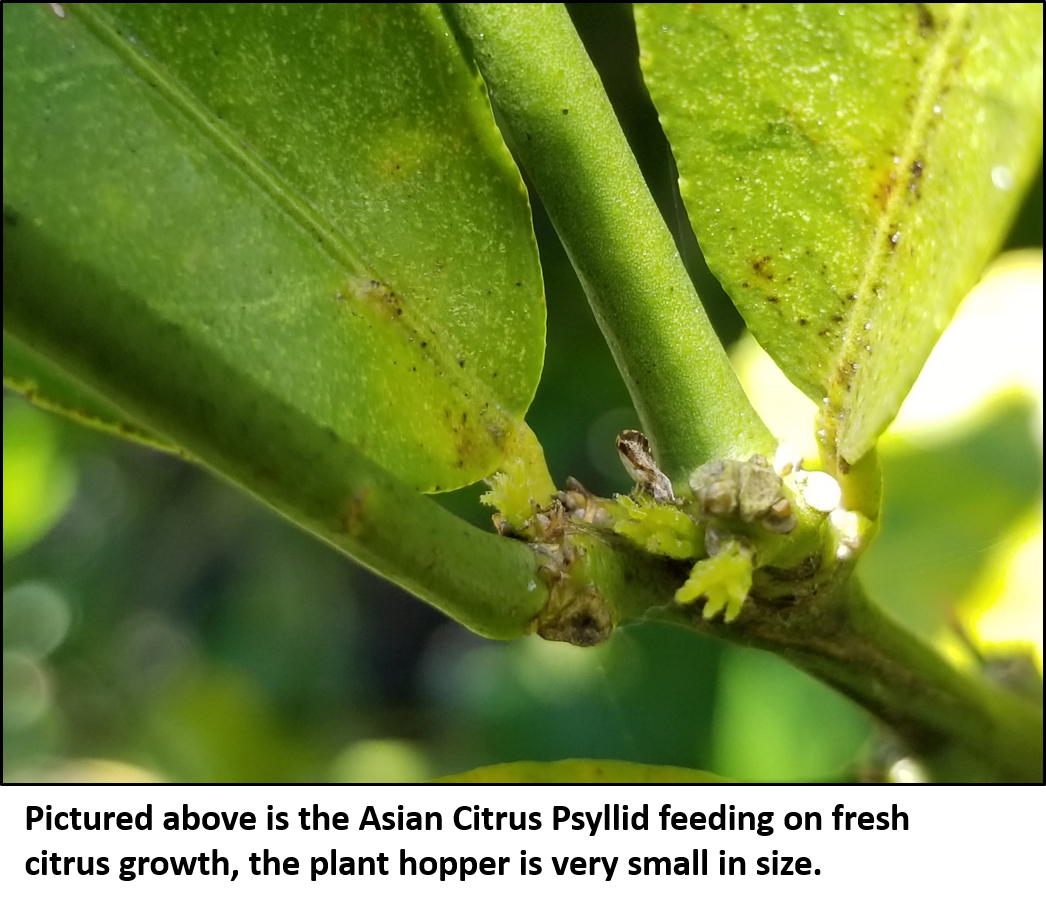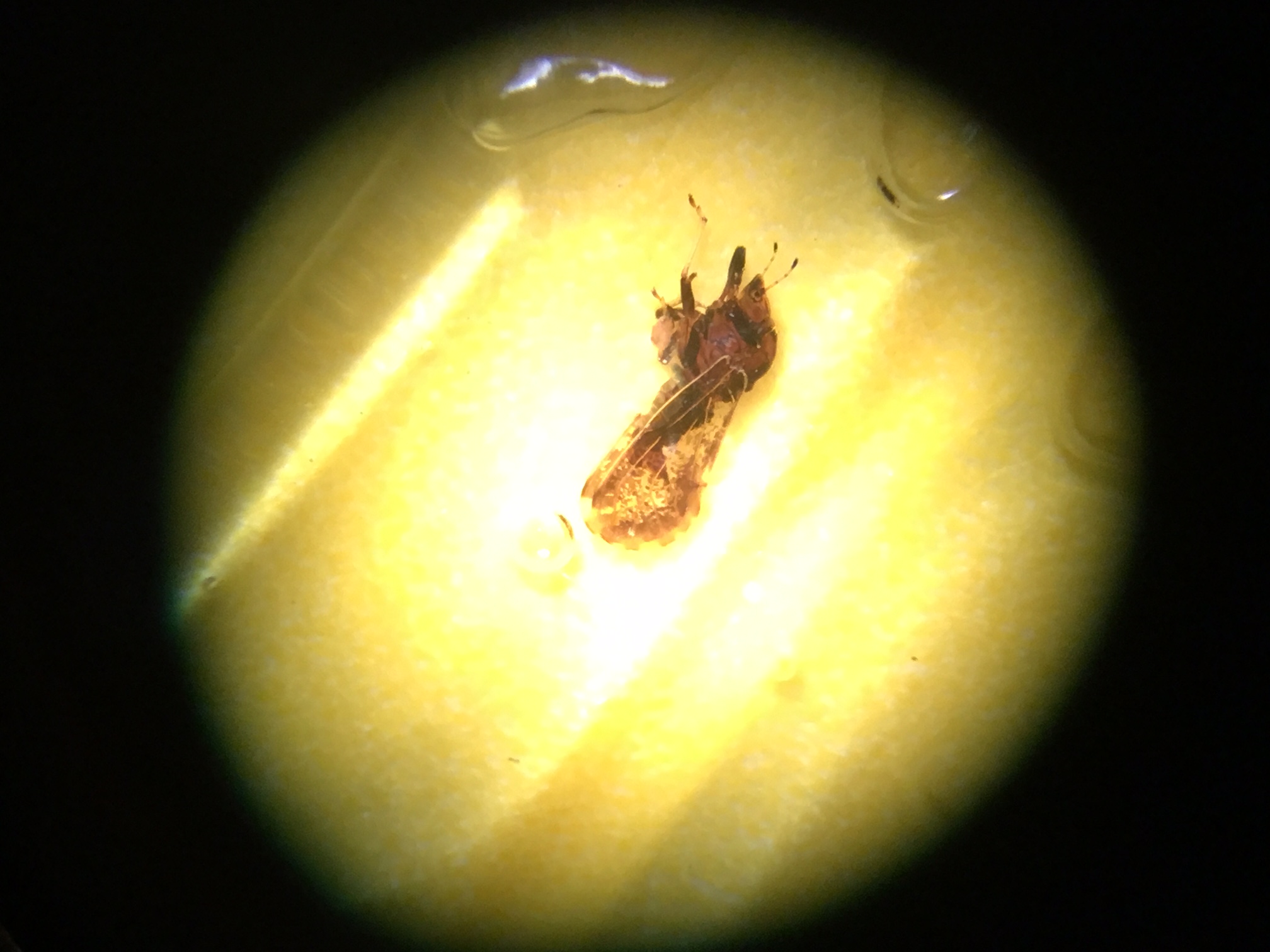- Evans, Richard
Summary
The citrus industry has become an important industry across the state of Georgia and with that growth comes the need to stop and slow the spread of citrus greening. Citrus greening is a disease affecting all citrus trees and is vectored by a small insect (Asian Citrus Psyllid or ACP). This pathogen has the potential to greatly hinder or damage the citrus industry in Georgia. Therefore, UGA Extension has been proactive rather than reactive. The Bryan County ANR program has spearheaded a response effort across South Georgia, with the help from numerous ANR Agents, to track the movement and presence of this potentially dangerous disease and its insect vector.
Situation
Citrus Greening (Huanglongbing or HLB) is serious disease of citrus because it affects all citrus cultivars (orange, lemon, satsuma, grapefruit, etc.) and causes rapid decline of trees, usually leading to death. This disease was once localized primarily to groves in Florida but has since moved into Georgia via its vector, the Asian Citrus Psyllid, which spreads the disease from plant to plant via feeding on young succulent growth. An increasing number of citrus plantings both in backyards or industrial sized groves means that both the insect and the pathogen it can carry have the potential to spread and become a serious problem quickly. The only reliable means of detection for the insect are (yellow) sticky card traps or visual scouting during periods of pest activity. Foliage, which displays the mottling characteristics, can be tested to provide an indication if the disease is present or not. Therefore, the need for tracking movement of this pest via trapping is paramount.
Response
UGA Extension has constructed a team of agents, led by the Bryan County ANR program, that has agreed to tackle this project. This team is tasked with deploying and distributing traps to homeowners and growers alike to monitor for the presence of the psyllid. Population levels of the Asian Citrus Psyllid (ACP) in citrus groves can be estimated to time insecticide sprays and to track the movement of this pest in Georgia, justifying the need for this project. This data can then be used to track the transmission and spread of the citrus greening disease. With a better understanding of the seasonal movement and distribution of this pest across the state we can significantly slow the progress of this pest and the disease it vectors. The following are the measures taken to this date to tackle this pest: • Secured Grant Funds – Bryan County ANR worked with the Citrus Growers Association to secure a funding source, approx. $4000 a year, for this trapping effort that will last the next three years. •UGA Extension Citrus Trapping Team – Bryan County ANR has created a team consisting of 28 counties and 29 agents across the southeast and southwest districts of Georgia which have agreed to carry out trapping efforts in their county. •Site Visits – Bryan County ANR makes site visits to any and all homeowners or growers concerned about their citrus to instruct and share information about citrus greening and what its impact is for those that have infected trees. • News articles and blogging – Bryan County ANR has written both newspaper and blog articles detailing the efforts and goals of this project, encouraging homeowner and growers to participate in this project while also informing citizens of Bryan, Effingham, Chatham, and Liberty counties.
Impact
Successes: • 32 Counties now have trapping efforts, spearheaded by UGA Extension, intended to track the movement and presence of ACP across Georgia. • 4 counties across the state have identified the presence of either the psyllid, disease, or both in citrus plantings. • Bryan County ANR has secured funding for this project totaling nearly $12,000 over the next three years. • The Bryan County ANR agent is now consulting directly with 100% of homeowners/growers within the county on how to handle citrus greening on their plantings. • Participating counties and counties all over the Southeast/Southwest of Georgia have access to traps to monitor for ACP in their own operations. Future Direction Entering year 3 of this study, the data collected from this project will lead to an updated map of where ACP has been found. Counties that have positively ID’s ACP can then send in samples to UGA Plant Pathology to be tested for Citrus Greening to proactively prepare Georgia citrus groves.
State Issue
Plant Production
Details
- Year: 2020
- Geographic Scope: Multi-County
- County: Bryan
- Location: College Station, Athens
-
Program Areas:
- Agriculture & Natural Resources
Author
Collaborator(s)
CAES Collaborator(s)
- Anderson, Holly C Hickey
- Carlson, D. Scott
- Collins, Douglas M.
- Crosson, David Luke
- Davis, Timothy Scott
- Dowdy, Michasia
- Edwards, Raymond Phillip
- Hanna, Wayne W
- Hayes, Brian W
- Hollifield, Stephanie M
- Ingram, Sydni Claire
- Jacobs, James L.
- Kichler, Jeremy M
- Mclemore, John
- Miller, Jennifer T.
- Morgan, James L.
- Oliver, Jonathan
- Price, Daniel Paul
- Price, Jacob G.
- Reeves, Benjamin Louis
- Shirley, Aubrey C
- Sutherland, David Bryce
- Torrance, Ty Nicholas
- Tyson, William G.
- Warren, Jessica
Non-CAES Collaborator(s)
- Lindy Savelle
Extension Impact


